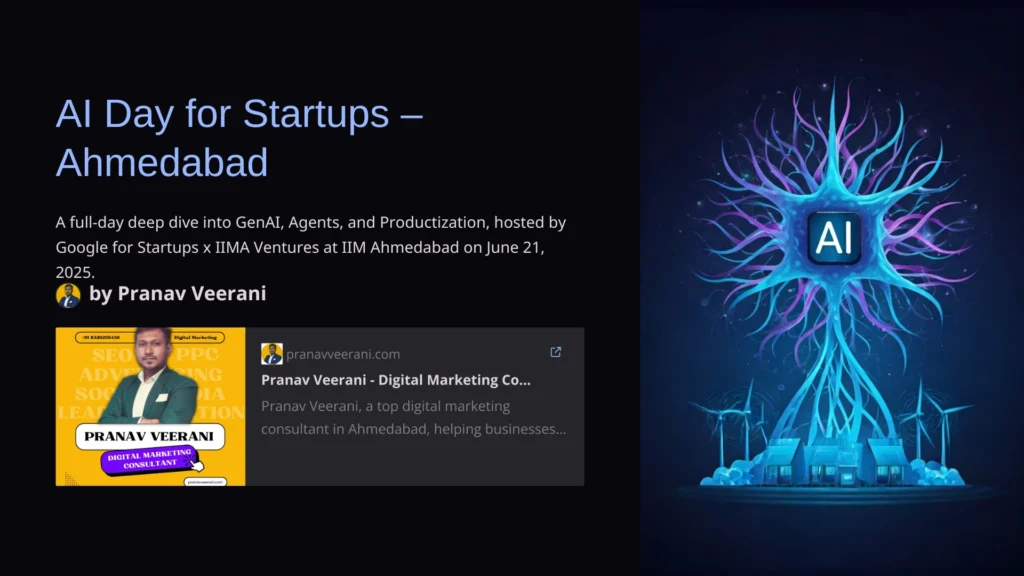On June 21, 2025, I had the opportunity to attend AI Day for Startups – Ahmedabad, a deep-dive event into the future of Generative AI (GenAI), hosted by IIMA Ventures in partnership with Google for Startups. It was a day packed with insights, hands-on learning, and visionary discussions around the next wave of AI applications and commercialization strategies.
🎯 About the Event
AI Day for Startups is a multi-city initiative by Google for Startups, focused on helping early-stage startups integrate Generative AI tools into their products. While last year’s sessions revolved around helping founders get started with GenAI, this year the focus shifted to advanced topics like:
- Multimodal AI
- AI Agents
- AI Commercialization
- LLM Interoperability
- Regional Language AI
🎤 Keynote Speakers & Highlights
Kailashnath M S – Partner, Ideaspring Capital
Kailashnath shared the investor perspective on how startups should think about ROI when embedding GenAI into their offerings. His talk emphasized the balance between innovation and commercial viability—especially important as AI development costs continue to evolve.
Hardik Prajapati – CIO, Infocusp
Hardik brought an enterprise lens, discussing AI’s real-world impact in sectors like manufacturing, worker safety, and health monitoring. He illustrated how AI vision systems are helping industrial players reduce risk and optimize workforce efficiency by analyzing movement, fatigue, and injury risk.
Vijaykumar Jangamashetti – Senior Technical Solutions Consultant, Google
Vijaykumar focused on AI Agents and Developer Tools, introducing frameworks such as:
- Gemini APIs
- LangChain
- Google’s Vertex AI
His demo covered real-time agent workflows, cost controls, and creating domain-specific agents using prompt chaining and external service integrations.
Sourabh Jain – Cloud Architect, Google
Sourabh led hands-on codelabs and technical walk-throughs showing how to:
- Use Google’s model builder
- Deploy multimodal models (text, image, video)
- Leverage Gemini’s function-calling capabilities
- Prototype with 5GS Studio
He emphasized the practicalities of model execution, including cost optimization, quota management, and choosing the right foundation models.
Vrijraj Singh – Google Developer Expert
Vrijraj focused on AI product integration, especially for startups building with Firebase, Flutter, and WebML. He shared how developers can create lightweight AI applications, even with limited infrastructure, and how to think modularly about AI in product design.
🔍 Key Insights from the Discussions
🧠 Multimodal AI is Here to Stay
What began as text-only GenAI has now evolved into fully multimodal ecosystems. Models can interpret and cross-reference across:
- Text
- Images
- Videos
- Audio
As shared during the sessions, modern LLMs reduce all media into shared embeddings, unlocking powerful cross-modal applications like:
- Intelligent video generation from prompts
- Real-time emotion or motion analysis in industrial settings
- Visual prompt alignment for content creators
🌐 AI for Real India: Offline & Regional Needs
A particularly impactful discussion revolved around the development of AI-powered mobile apps for farmers in remote Indian villages. These apps:
- Work offline due to low internet availability
- Use Gemini models for localized, contextual recommendations
- Analyze soil, weather, and crop data on-device
Government-backed initiatives were also highlighted, focusing on collecting regional language data (Gujarati, Marathi, etc.) to train localized LLMs. This is critical to enable scalable AI deployment across India’s linguistic diversity.
💰 Subscription Models & AI Commercialization
Panelists shared how AI is shifting from experimentation to monetization, with most GenAI tools adopting subscription pricing. This allows:
- Predictable cost modeling
- Credit-based usage tiers (e.g., “X videos per month”)
- Protection against backend API overuse
As model training becomes cheaper, we can expect more accessible AI tools at scale.
🔐 Privacy, Regulation & Ethics
Several speakers raised critical points around AI privacy. A now-famous example was mentioned—when a Samsung engineer leaked sensitive code to ChatGPT during testing. This underscores the need for:
- Encrypted data workflows
- Transparent model behavior
- Reading and enforcing AI provider privacy terms
🤖 Model Interoperability & Agent Protocols
A new concept introduced was the Model Context Protocol, enabling different AI agents to communicate and collaborate in real-time. This lays the groundwork for building AI ecosystems that are:
- Interoperable across models (e.g., Gemini ↔️ Claude)
- Plug-and-play for startups
- Ready for integration with government and enterprise-grade tools
📌 Final Thoughts
AI Day for Startups wasn’t just an event—it was a playbook for the future of AI-first startups in India. From industry-grade AI solutions to local language models and advanced agent tooling, the sessions emphasized one thing:
AI is no longer an optional layer—it’s becoming the foundation.
For founders, developers, and product teams, the message is clear:
✅ Learn the tools
✅ Build real use cases
✅ Think long-term commercialization
